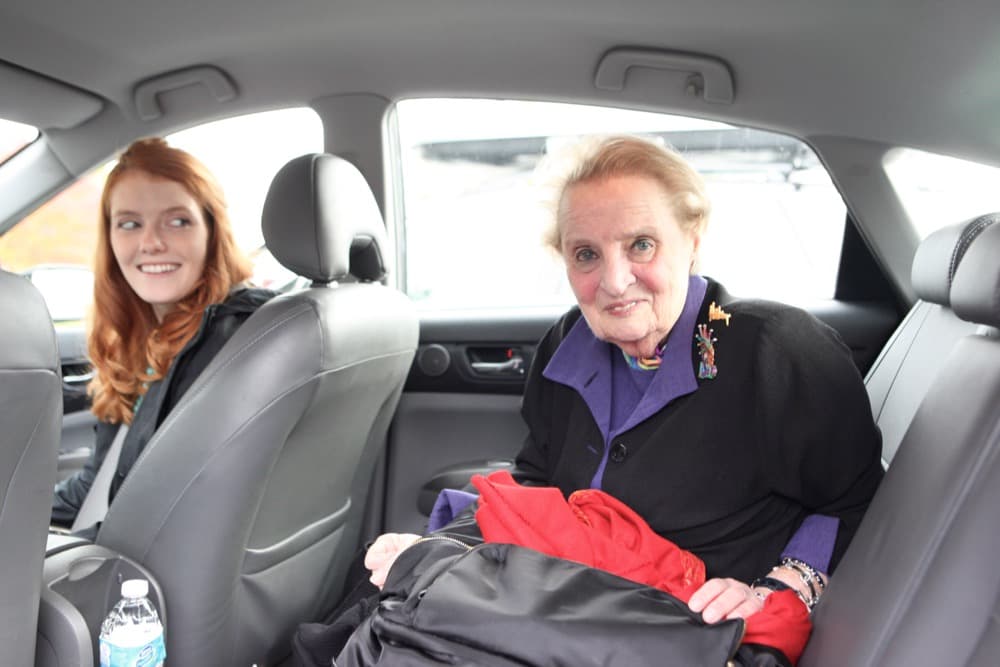I ended up yesterday in a rather small car with Madeleine Albright, this country's first female secretary of state and a former U.S. ambassador to the United Nations.

She had just wrapped up a pro-Hillary Clinton event at the University of Denver, where she spent a lot of time in her teenage years. The most convenient place for our interview to happen was, apparently, in the back seat of a grey Prius. The 79-year-old really likes to drive, but we were in fact stationary.
Our conversation was about 10 minutes long, covering her life in Denver (with a full list of all her addresses here), her experience as a refugee and her thoughts on sexism in modern politics. Here are the highlights.
One of your first media appearances was in a film about young refugees during World War II. Can you tell us about the attitudes you saw as a refugee during that war, and what you see now?
Albright: I have to tell you: What happened was my father was a Czechoslovak diplomat, and we spent the war in England. I was in London during the Blitz. There was this movie they made about a little refugee child. (Note: The child was her.) And then we came to the United States after the communists took over in Czechoslovakia.
My father used to say this on a regular basis, that people in World War II, they’d say, "We’re so sorry your country’s been taken over by a terrible dictator. You’re welcome here, and when are you going home?"
When we came to the United States, people said, "We’re so sorry, your country’s been taken over by a terrible system. You’re welcome here, and when will you become citizens?"
My father said that was the difference between America and every other country, and I think there are now so many things that need to be done in terms of how to deal with the refugees. And I happen to believe that refugees can be very much a strength for a country, and people that are grateful, that are entrepreneurial, that want to be part of a new society.
What was your life in Denver like?
Albright: I came here when I was 12 years old. What had happened was my father got a job at the University of Denver. We had no idea where Denver was. Anyway, when we first came here we lived in a lot of different places, and I remember all the addresses. 995 South Williams, and then we were at 1045 Gaylord, and then I went to Morey junior high, and then we moved downtown, to 13th and Bannock, when nobody lived downtown. Because we lived in this very small apartment, I did my studying down at the Denver Public Library.
And then we were at 2050 South Race. And then, when I went to college my parents bought a house over here at 2314 South Madison. So all of my life had kind of been around here.
What kind of sexism did you encounter as a woman in politics, and how does it compare to the current campaign?
Certainly not the kind of vulgarity that we have now, but even when I had high-level jobs there were certainly statements about ‘Don’t be so emotional.’ … The adjectives are always different ...
I think that there have been changes. In fact, I thought there were changes. I think that has happened now is something that is very, very troubling in terms of putting out front what many people thought was not a part of our society anymore.
You’ve been back to Colorado a number of times, obviously. What's your read of Colorado politics?
I can’t say I'm an expert on Colorado politics. I think Senator Michael Bennet is a fantastic senator, Governor Hickenlooper is one of the people that I think have done a great job for Colorado -- but it is a confusing state. I think there are parts of it that are more conservative, and then others that are really very liberal. I think it’s a very interesting state. It always has been, in terms of what’s been happening here. It is my real hope that people will see that Colorado will be much better off if we elect Hillary Clinton.
What would you change about your career?
I have a regret: That I never ran for office
I have had an incredible job. I grew up with foreign policy. All we ever talked about was foreign policy in my house. But there’s something about having the support of the people, of being able to feel that you've got a job not just because the president of the United States wanted you there, but the people. So, I love doing campaigning because it’s a way of understanding in a democracy.
Correction: Due to my transcription error, this article previously and incorrectly stated that Albright said she lived at 1025 Gaylord. She said 1045 Gaylord.











